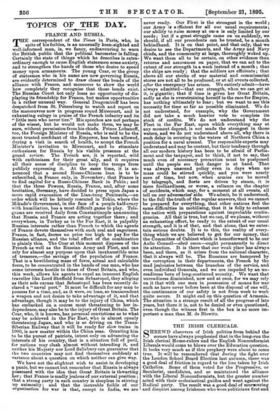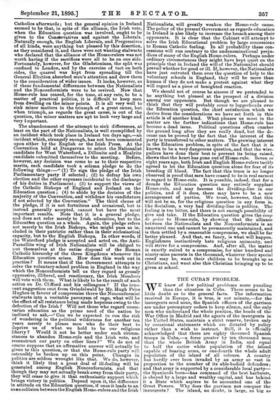THE IRISH CLERICALS.
SHREWD observers of Irish politics from behind the scenes have always prophesied that in the long-run the Irish clerical Home-rulers and the English Nonconformist Liberals would come to blows over the Education question. It looks very much as if this prophecy were about to come true. It will be remembered that during the fight over the London School Board Election last autumn, there was a good deal of friction in regard to the line taken by Irish Catholics. Some of them voted for the Progressive, or Secularist, candidates, and so maintained the alliance with the Liberal Nonconformists, but the greater number acted with their ecclesiastical guides and went against the Radical party. The result was a good deal of murmuring and disquiet among Irishmen who were politicians first and Catholics afterwards ; but the general opinion in Ireland seemed to be that, in spite of the alliance, the Irish vote, when the Education question was involved, ought to be given to the ConStrvatives and against the Liberals. Naturally enough, the English Liberals, and Progressives of all kinds, were anything but pleased by this desertion, as they considered it, and there were not wanting stalwarts who declared that the alliance of the Home-rulers was not worth having if the sacrifices were all to be on one side. Fortunately, however, for the Gladstonians, the split was confined to London, and by the exercise of tact on both sides, the quarrel was kept from spreading till the General Election absorbed men's attention and drew them to the consideration of wider issues. It looks, however, as if these fundamental differences between the Nationalists and the Nonconformists were to be revived. Now that Home-rule has ceased, for the time, at any rate, to be a matter of practical politics, it is difficult to keep men from dwelling on the minor points. It is all very well to sink minor matters in the triumph of a great cause, but when triumph, as regards the great cause, is out of the question, the minor matters are apt to look very large and very important.
The abandonment of the attempt to sink differences, at least on the part of the Nationalists, is well exemplified by an incident which took place in Ireland ten days ago,—an incident which, strangely enough, has not been commented upon either by the English or the Irish Press. At the Convention held at Dungarvan to select the Nationalist candidate for West Waterford, a Dillonite and a Healyite candidate submitted themselves to the meeting. Before, however, any decision was come to as to their respective merits, each candidate took a solemn pledge to do the following things :—" (1) To sign the pledge of the Irish Parliamentary party if selected ; (2) to defray his own election and the other expenses incidental to the discharge of his duties in Parliament ; (3) to support the views of the Catholic Bishops of England and Ireland on the Education question ; (4) to abide by the decision of the majority of the Convention, and withdraw his candidature if not selected by the Convention." The third clause of the pledge, if it is not fortuitous and occasional, but is instead generally accepted, cannot but have the most important results. Note that it is a general pledge, and does not refer merely to Irish education, but to the Education question as a whole. Again, the pledge refers not merely to the Irish Bishops, who might pass as in- cluded in their patriotic rather than in their ecclesiastical capacity, but to the English Bishops. In other words, if the Waterford pledge is accepted and, acted on, the Anti- Parnellite wing of Irish Nationalists will be obliged to put themselves at the entise disposal of the Roman Catholic hierarchy of the three Kingdoms whenever the Education question arises. How does this work out in practice ? It means that if the Government attempts to solve the voluntary-school problem in England in the way which the Nonconformists tell us they regard as grossly oppressive, illiberal, and reactionary, the Irish Members will vote with them. What is likely to be the result of such action on Dr. Clifford and his colleagues ? If the inno- cent suggestion sent from Grindelwald by Mr. Hugh Price Hughes in favour of compromise threw the Nonconformist stalwarts into a veritable paroxysm of rage, what will be the effect of all resistance being made hopeless owing to the defection of the Irish ? Will not those who regard unsec- tarian education as the prime need of the nation be inclined to ask,—' Can we be expected to run the risk of wandering in the political wilderness for another ten years merely to please men who do their best to deprive us of what we hold to be our religious liberty ? Would it not be better under such circum- stances to abandon Home-rule and the Irish vote, and reconstruct our party on other lines ?' We do not of course suppose that an affirmative answer will actually be given to this question, or that the Home-rule party will ostensibly be broken up on this point. Changes in politics are seldom wrought like that. We do, however, think it likely that a great deal of ill-feeling will be generated among English Nonconformists, and that though they may not actually break away from their party, they will cease to give it that enthusiastic support which brings victory in politics. Depend upon it, the difference in attitude on the Education question, if once it leads to an oDen collision between the English Home-rulers and the Irish Nationalists, will greatly weaken the Home-rule cause. The policy of the present Government as regards education in Ireland is also likely to increase the breach among their opponents. It is clear that the Cabinet will attempt to solve the Irish Educational problem by large concessions to Roman Catholic feeling. In all probability these con- cessions will run contrary to the undenominational preju- dices of many of the English Home-rulers. Perhaps under ordinary circumstances they might have kept quiet on the principle that in Ireland the will of the Nationalist should prevail whether for good or ill. If, however, the Nationalists have just outvoted them over the question of help to the voluntary schools in England, they will be more than human if they do not make a protest against what they will regard as a piece of benighted reaction.
We should not of course be sincere if we pretended to be anything but pleased at the prospect of a division among our opponents. But though we are pleased to think that they will probably come to loggerheads over the Education question, the chief satisfaction which we derive from the considerations we have set forth in this article is of another kind. What pleases us most in the matter are the further indications that Home-rule has become a dead issue. Political questions often cumber the ground long after they are really dead, but the de- cease can be proved by the fact that the interest of the party is transferred to other matters. The growing interest in the Education problem, in spite of the fact that it is known to be a very dangerous question, and that the wire- pullers have done their best to prevent its being raised, shows that the heart has gone out of Home-rule. Seven or eight years ago, both Irish and English Home-rulers tacitly agreed to let the Education question alone for fear of its breeding ill blood. The fact that this truce is no longer observed is proof that men have ceased to be in real earnest in regard to Home-rule. It is possible, indeed, that for a decade the Education question may entirely supplant Home-rule, and may become the dividing-line in our politics, and if it does, there may have to be a new arrangement of parties. We trust, however, that this will not be so, for the religious question in any form is, like Socialism, a very bad dividing-line in politics. The feeling is too bitter, and there is not enough possibility of give and take. If the Education question gives the coup de greice to Home-rule, by showing that the alliance between the Nationalists and the Nonconformists is an unnatural one and cannot be permanently maintained, and is then settled by a reasonable compromise, we shall be far better pleased. And that, we fancy, is what will happen. Englishmen instinctively hate religious animosity, and will strive for a compromise. And, after all, the matter is exactly suited to a compromise, for nine hundred and ninety-nine parents in the thousand, whatever their special creed may be, want their children to be brought up as Christians, and want also this Christian bringing up to be given at school.



































 Previous page
Previous page